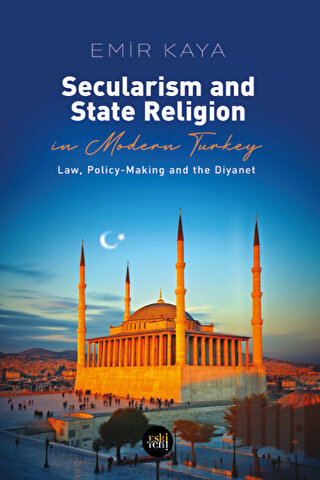
The Diyanet, the official face of Islam in Turkey, is the ‘Presidency of Religious Affairs’, a governmental department established in 1924 after the break-up of the Ottoman Empire and the abolition of Caliphate.
In this book, Emir Kaya offers an in-depth multidisciplinary analysis of this vitalinstitution. Focusing on the role of the Diyanet in society, Kaya explores the balance the institution has to strike between the Muslim traditions of the Turkish population and the secular creed of the Turkish state. By examining the various laws that either bolstered or hindered the Diyanet’s budgets and activities, Kaya highlights the institutional mindsets of the Diyanet membership. He also evaluates its successes and failures as a state department that must consistently operate within the context of the religiosity of Turkish society. By situating all of this within the two competing - but often complementary - concepts of religion and secularism, Kaya offers a book that is important for those researching the interplay of Islam and the state in Turkey and beyond.
This fascinating study of law in action demonstrates the skilful arrangements that Turkey as a modern secular Muslim polity has put in place and navigates successfully to survive and prosper as a nation. Detailed examination of the Diyanet as a central institution to manage Turkey’s Islamo-secular identity clarifies that law and religion must learn to co-exist and can indeed work together for the greater good.
Werner Menski
Emeritus Professor of Law, SOAS, University of London
This impressive book offers a probing analysis of the role and the evolution of Turkey’s Directorate of Religious Affairs, along with ongoing tension between secularism and Islam. [Kaya] is thoughtful, persuasive and objective in his analysis. This will become one of the authoritative books on the Diyanet.
M. Hakan Yavuz
Professor of Political Science, University of Utah
Kaya makes an important contribution to a growing literature in Turkish studies that questions the usefulness of standard tropes characterizing Turkish politics and society along a secular vs. religious divide. Deploying “descriptive methods of legal pluralist theory,” the book seeks to avoid “the vicious circles of ‘secularism talk’” that have convoluted the study of the relationship between state, religion, and society in Turkey for decades.
Kristin E. Fabbe
Associate Professor of Business Administration, Harvard University
The Diyanet, the official face of Islam in Turkey, is the ‘Presidency of Religious Affairs’, a governmental department established in 1924 after the break-up of the Ottoman Empire and the abolition of Caliphate.
In this book, Emir Kaya offers an in-depth multidisciplinary analysis of this vitalinstitution. Focusing on the role of the Diyanet in society, Kaya explores the balance the institution has to strike between the Muslim traditions of the Turkish population and the secular creed of the Turkish state. By examining the various laws that either bolstered or hindered the Diyanet’s budgets and activities, Kaya highlights the institutional mindsets of the Diyanet membership. He also evaluates its successes and failures as a state department that must consistently operate within the context of the religiosity of Turkish society. By situating all of this within the two competing - but often complementary - concepts of religion and secularism, Kaya offers a book that is important for those researching the interplay of Islam and the state in Turkey and beyond.
This fascinating study of law in action demonstrates the skilful arrangements that Turkey as a modern secular Muslim polity has put in place and navigates successfully to survive and prosper as a nation. Detailed examination of the Diyanet as a central institution to manage Turkey’s Islamo-secular identity clarifies that law and religion must learn to co-exist and can indeed work together for the greater good.
Werner Menski
Emeritus Professor of Law, SOAS, University of London
This impressive book offers a probing analysis of the role and the evolution of Turkey’s Directorate of Religious Affairs, along with ongoing tension between secularism and Islam. [Kaya] is thoughtful, persuasive and objective in his analysis. This will become one of the authoritative books on the Diyanet.
M. Hakan Yavuz
Professor of Political Science, University of Utah
Kaya makes an important contribution to a growing literature in Turkish studies that questions the usefulness of standard tropes characterizing Turkish politics and society along a secular vs. religious divide. Deploying “descriptive methods of legal pluralist theory,” the book seeks to avoid “the vicious circles of ‘secularism talk’” that have convoluted the study of the relationship between state, religion, and society in Turkey for decades.
Kristin E. Fabbe
Associate Professor of Business Administration, Harvard University
| Taksit Sayısı | Taksit tutarı | Genel Toplam |
|---|---|---|
| Tek Çekim | 146,00 | 146,00 |
















